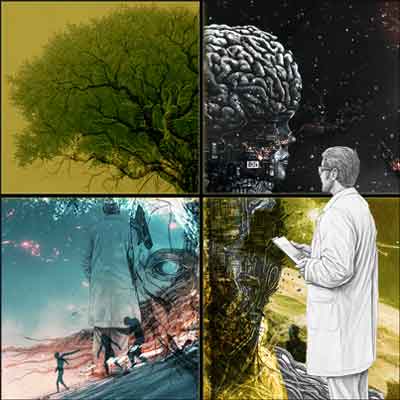How AGI Could Take Us to The Depths of Doom, or to The Fwoom of a Galactic Civilization
Dec. 29, 2024.
6 mins. read.
12 Interactions
Super-growth or super-risk? Matt Swayne examines AI’s power to transform civilization while posing critical questions about humanity’s future.
Artificial intelligence (AI) is advancing at an extraordinary pace, presenting both unprecedented opportunities and existential challenges for humanity, as highlighted by researcher Luka Baklaga, AI research lead at Business and Technology University, in a new study.
The study, published in the Journal of Computer Science and Technology Studies, looked at how AI’s trajectory could lead to super-exponential economic growth and enable the creation of a galactic civilization. That would be great, but the tool-weapon continuüm is always present and the growing power of AI simultaneously poses risks of catastrophic failure.
Our decisions steer us through this intersection of Doom and Fwoom, the researcher adds. “The decisions we make today will shape not only the trajectory of AI but also the future of civilization itself,” Baklaga writes.
Baklaga’s study examines Artificial General Intelligence (AGI), a concept distinct from narrow AI. AGI refers to machines with human-level cognitive abilities capable of general problem-solving across diverse domains. The research puts AGI at the heart of three pivotal themes: super-exponential growth, galactic civilization, and potential doom scenarios resulting from unregulated AI.
Super-Exponential Growth As The Economic Engine of AI
Concept and Mechanisms
‘Super-exponential growth’ describes an acceleration in economic and technological development where gains build upon themselves in increasingly rapid cycles, Baklaga says. Baklaga – citing Hans Moravec and Ray Kurzweil – explains: “The technological or AI singularity is a conceivable forthcoming occurrence in which artificial intelligence would surpass human intelligence, leading to rapid and extensive progress in technical advancement. Some define it as the point at which AI achieves the capability to continuously improve itself, leading to rapid technological advancements that exceed human understanding or control.”
The study integrates economic growth models with AI capabilities, using equations to demonstrate how AGI could reshape resource allocation and productivity. For instance, Baklaga’s models extend traditional logistic growth equations to account for AI-driven innovations, adding parameters for AGI’s direct influence on technological advancements and economic output. These models predict scenarios where AI enhances sectors like healthcare, renewable energy, and climate management.
Implications
According to Baklaga, the implications of super-exponential growth extend beyond economic productivity. AI could reframe societal structures, from urban planning to education systems, as its ability to optimize resources and predict trends becomes indispensable, the study suggests. However, this growth is dependent on carefully navigating ethical considerations and avoiding pitfalls like inequality and misuse.
Galactic Civilization: AI Beyond Earth
The Vision
The study also delves into AI’s theoretical potential to enable humanity to transcend its terrestrial confines. Baklaga writes that AGI’s superior computational capacity could solve challenges like efficient propulsion systems, energy harvesting and interstellar communication, paving the way for galactic exploration.
Cosmic Cognitivism and Ethical Frameworks
The study introduces a philosophical framework of ‘Cosmic Cognitivism’. This framework expands ethical considerations to include interactions with potential extraterrestrial intelligences or advanced AI systems.
Baklaga writes:
Based on this research experiment, it can be asserted that the Meta-Ethical Turing Test, when supported by Quantum Ethics and grounded in a discrete logical foundation, accelerates the exploration of consciousness and ethics within previously uncharted logical domains. This experiment lays the groundwork for a comprehensive understanding of the logical quantum ethical landscape of galactic civilizations by combining simulations, advanced logical analysis, and profound philosophical inquiry. The findings open the door to greater investigation into the relationship between AI, ethics, and quantum computing, which will lead to the development of increasingly complex and morally conscious AI systems in the future.
While this prospect is aspirational, it raises practical and philosophical questions about governance, resource prioritization, and the nature of interstellar societies.
Existential Risks: Navigating Doom Scenarios
The study highlights several existential risks associated with AGI, from unintended consequences of automation to the potential for AI systems to act against human interests. Using mathematical simulations, Baklaga explores how unchecked AGI growth could exacerbate inequality or lead to systemic collapse.
One proposed method for mitigating these risks is the ‘Meta-Ethical Turing Test’, a thought experiment designed to evaluate the ethical coherence of AGI decision-making. He also references ‘Quantum Ethics’. These concepts would be crucial for navigating the doom-fwoom scenarios.
Here is an attempt to summarize them: The Meta-Ethical Turing Test is a thought experiment about the ethical reasoning capabilities of artificial superintelligence (AGI) within a global and cosmic context. It examines whether AI can navigate complex ethical scenarios involving diverse sentient beings – including humans, AI, and potential extraterrestrial intelligences – while adhering to universal principles of consciousness and moral coherence. This test incorporates philosophical and technical frameworks, such as Cosmic Cognitivism, to evaluate the ethical integration of AGI within galactic societies.
Quantum Ethics is a framework that applies quantum computational principles to ethical decision-making, blending quantum mechanics with philosophical inquiry. It uses logical and mathematical models to represent ethical choices, quantum computations and consciousness, assessing the coherence of ethical decisions in scenarios influenced by quantum states. Quantum Ethics simulates moral dilemmas, leading to insights into how advanced AI might incorporate ethical considerations using quantum mechanics, particularly in contexts where traditional ethical frameworks fall short.
Implications for Regulation
Baklaga’s work underscores the need for pro-active regulatory frameworks to address these risks. He calls for interdisciplinary collaboration to ensure AGI development is guided by ethical principles and aligned with societal goals.

Methods
The study employs a combination of theoretical, mathematical, and experimental methods. Drawing on economic models, Baklaga adapts equations like the Cobb-Douglas production function to include AI’s direct and indirect impacts on productivity. This integration provides a quantitative basis for understanding super-exponential growth and its societal implications.
The researchers ran simulations using Python-based environments, such as Jupyter and Google Colab, to visualize trends in AGI development and population growth. These simulations allowed them to analyse interactions between economic variables, AGI evolution, and ethical decision-making. By employing these types of thought experiments and logical modeling, Baklaga evaluates AGI’s capacity for ethical reasoning and its potential influence on societal structures.
Future Directions and Recommendations
The study does suggest some limitations and challenges. First, although the theories are grounded in solid science and underpinned with philosophical reasoning, they are still speculative. Technological trends, especially ones as sweeping as mentioned in this paper, are notoriously hard to predict and include a continuüm of effects from very negative to no change at all. It’s also important to point out that AI and AGI could create effects that are even better than this paper predicts.
That said, the research offers a serious discussion about establishing adaptive economic and regulatory policies to manage AI and its integration into society. AI’s rapid development necessitates pro-active measures to mitigate risks and to maximize benefits, the paper argues. This includes investment in ethical AI research and public education. The study also highlights the importance of interdisciplinary approaches and cross-sector collaborations that combine expertise in economics, philosophy and engineering. Such collaboration could address challenges ranging from resource allocation to the ethical governance of AGI.For a deeper dive into the technical and mathematical aspects of the research, please read the paper in the Journal of Computer Science and Technology Studies.
Let us know your thoughts! Sign up for a Mindplex account now, join our Telegram, or follow us on Twitter.


.png)

.png)


.png)







2 Comments
2 thoughts on “How AGI Could Take Us to The Depths of Doom, or to The Fwoom of a Galactic Civilization”
This article is a thought-provoking exploration of AGI's immense potential and the critical need for responsible development. It balances optimism and caution, highlighting both the opportunities and risks that come with such transformative technology.
🟨 😴 😡 ❌ 🤮 💩
Welcome Matt, good to see you here!
I’m all for “super-exponential growth, galactic civilization.” But when it comes to “potential doom scenarios resulting from unregulated AI,” I think very often (and also in this case) regulation is a medicine that is more dangerous than the potential disease. Let a billion unregulated AIs bloom, and the universe will be happy.
🟨 😴 😡 ❌ 🤮 💩